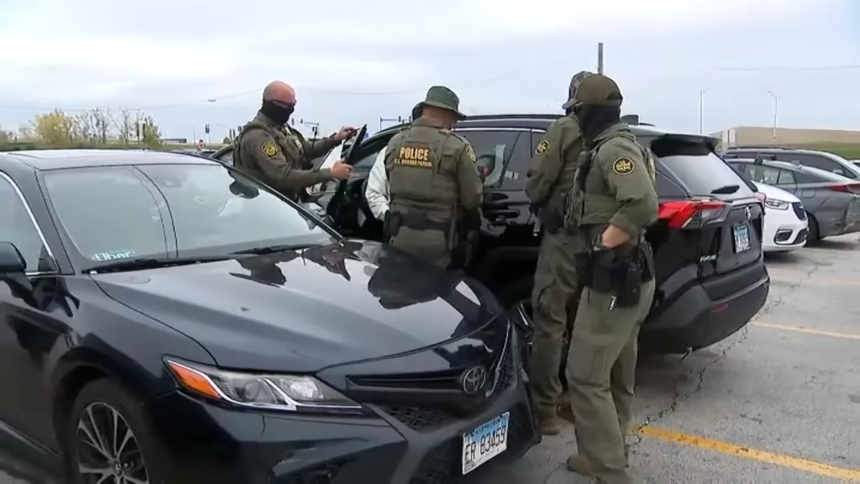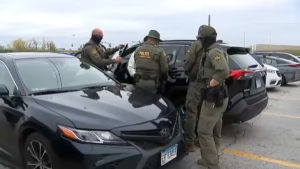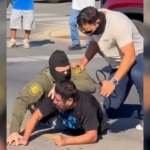Federal agents targeted the rideshare driver staging area at O’Hare International Airport and arrested eleven individuals. This marks the second intervention at the same location in just over a week and reignites concerns within a sector that employs numerous immigrant workers and faces daily issues with controlled site access.
Agents conducted this targeted operation near the designated rideshare parking lots. Images circulating through a citizen alert application show agents patrolling and checking drivers awaiting ride requests. In a statement to the press, the Department of Homeland Security confirmed the location, timing, and number of arrests, aligning with reports from onlookers.
Authorities further clarified that those detained are from Colombia, Kyrgyzstan, Mexico, Mongolia, Poland, Russia, Ukraine, and Venezuela. Several have prior records, including domestic violence, drunk driving, and visa overstays, and some are subject to final removal orders.
The immediate impact on the ground was evident. Interruptions of rides, disruptions of queues, and phones flashing alerts to colleagues and family members followed. Driver representatives voiced concerns that a climate of fear may permanently deter professionals from using the official staging area, which is essential for efficient passenger pickup.
Bailey Koch, speaking on behalf of the Illinois Drivers Alliance, emphasized the workers’ role in the local economy and daily airport operations: “These drivers are essential to each of our communities.” The organization activated a support cell to identify those arrested and assist their families. “We’re trying to find out where they are, where their families are, and we aim to provide them with as many resources as possible, while working to ensure this doesn’t continue to happen,” she explained.
A Pattern of Repeated Interventions
This concern about repeated interventions stems from recurring enforcement actions. For example, on October 10, federal agents conducted a similar operation in the same area and made multiple arrests. Following that episode, the Alliance collaborated with the City of Chicago to enhance regulated access by installing signage, verifying credentials, and maintaining a continuous security presence.
Continuing their response, Koch highlighted ongoing collaboration: “To date, we have collaborated with the City to provide 24-hour security at this staging area and strictly enforce access: if you lack proper credentials, you cannot enter this zone.” The organization is investigating how federal agents re-entered the site and what additional steps it can take to prevent unauthorized entry, following previous enhancements.
The O’Hare rideshare staging area sees an estimated several hundred vehicles parked daily, according to driver representatives. Platforms direct drivers there to minimize terminal traffic and congestion while ensuring ride assignments follow the order of arrival. This high concentration of vehicles facilitates efficient passenger service but also offers a central checkpoint for federal agents. As a result, enforcement activities at this site can potentially immobilize dozens of vehicles simultaneously, disrupt ride queues for hundreds of drivers, and cause delays for passengers—especially during peak hours, such as weekday mornings and evenings, when demand spikes.
Driver advocates report that following repeated operations at this site, approximately 10-20% of drivers now avoid the official staging area, risking airport penalties, while others reduce their working hours. This results in a noticeable drop in available drivers during peak periods. Authorities, meanwhile, maintain that the enforcement actions are few and targeted, with two major interventions reported in October, conducted pursuant to existing court orders.
Beyond the reported eleven arrests and the list of nationalities provided, federal authorities have released no additional data on the total number of drivers screened or vehicles checked in these operations. No individual identities or case-specific details on the prior records or removal orders have been disclosed. Authorities have also not announced the locations to which those detained were transported, nor the timeline for their next legal hearings. Questions also remain about the method of agent access, especially after ten days of enhanced security and check procedures have been implemented.
In response to ongoing events, the Drivers Alliance will host information sessions for professionals. These sessions remind attendees which documents to retain, guide them through checkpoints, explain how to report intrusions, and outline potential impacts on airport permits.
The objective remains clear: avoid escalation, reduce incident risks, and ensure service continuity for travelers.
Ultimately, the rapid succession of federal interventions has fueled the perception that a campaign now targets specific workplaces. For many drivers balancing family obligations and vehicle payments, the risk of sudden checks and possible detention now weighs on daily decisions. The airport faces the challenge of maintaining public order without paralyzing a key mobility hub, while advocacy groups call for clarified protocols and proportionate interventions to prevent the staging area from becoming a lasting flashpoint.
https://ctninfo.com/?p=37707&preview=true
By the newsroom — Based on reporting by Victor Jacobo for CBS Chicago (October 19, 2025)








